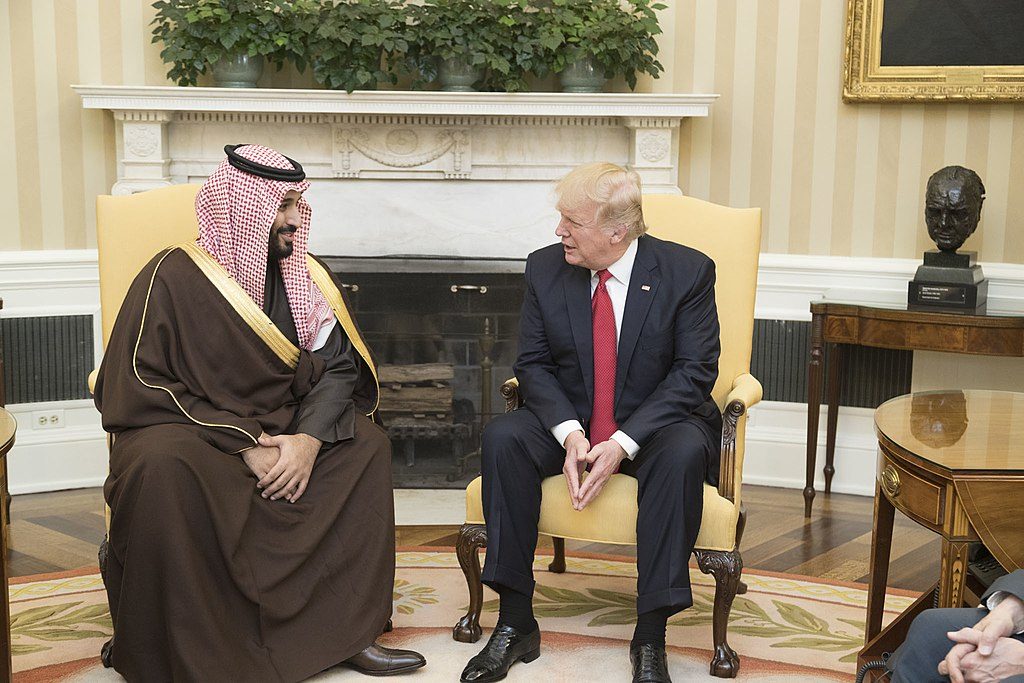The Persian Gulf and its entryway, the Strait of Hormuz, have been a cockpit of U.S. strategic interest since President Jimmy Carter declared, in his January 1980 State of the Union address, that “An attempt by any outside force to gain control of the Persian Gulf region will be regarded as an assault on the vital interests of the United States of America…” Today, however, a different waterway is swiftly becoming the Persian Gulf’s equivalent, if not surpassing it.
The Red Sea’s Importance
It is the Red Sea and its entryway, the Bab el-Mandeb (“Gate of Tears”), though which more than half the world’s most important commerce—from fossil fuels to Chinese toys—flows. That waterway is the object of significant strategic cooperation and competition among the U.S., China, France, Japan, India, Turkey, and others, and its flanks are home to tumultuous conflicts or potential conflicts such as those in Sudan, Somalia, and the bugbear of them all, Yemen. Daily, refugee flows out of Yemen alone generate crime, dislocation, and death. But the flow of refugees out of Yemen is nearly matched by the flow of refugees from the Horn of Africa, who arrive seeking employment in the Gulf states and as refugees from conflicts in eastern Africa, such as in Somalia. According to the United Nations High Commissioner for Refugees, these flows have helped push the total number of refugees in the world from 65 million to 70 million.
Moreover, while Iran has been—according to the U.S. and its regional allies—the primary threat to Persian Gulf commerce in oil and gas, the multi-state presence in the Red Sea area presents a kaleidoscopic array of potential contenders. Nowhere perhaps is this array more instantly visible than in the tiny East African state of Djibouti, where as one U.S. Marine put it recently, “deploy one more trooper to Djibouti and it might sink.” And he didn’t mean just a U.S. “trooper,” because there are French, Chinese, Italian, and Japanese forces there as well. One can imagine how the government of Djibouti plays off these states against one another to get the best possible deals for itself.
In addition to the military forces semi-permanently stationed in Djibouti, the region is also home to an almost constant presence of several navies. These were once led by the multilateral and seemingly semi-permanent anti-piracy task force established as Operation Ocean Shield (U.S./NATO), which lasted from its creation in 2009 to its stand-down in 2016. More than two dozen nations, from NATO and elsewhere—including, prominently, India—participated. Today, absent the task force, piracy is picking up again.
To regional minds—and to some external actors as well—the Yemen War is one waged by Saudi Arabia and the UAE on behalf of the United States.
Beyond anti-piracy, the U.S. Navy has several reasons for its continued presence in the Red Sea, ranging from general Freedom of Navigation Operations (FON) to anti-Iran patrols. The latter are aimed primarily at arms smuggling under the aegis of the alliance of convenience between Tehran and the rebel Houthis fighting—and winning—in Yemen.
The most recent major state to arrive in the Red Sea area with an interest beyond simply commerce is one of the most powerful of the NATO states—though a bit wayward in that regard of late—Recep Tayyip Erdogan’s Turkey. It seems in some respects and in some quarters that such a move on Turkey’s part might signal a “return of the Ottomans,” a disturbing development for most regional players who have a knowledge of history as well as an inkling of the struggle in the Islamic world—at least the Middle Eastern portion—among several state powers for the moniker of “the leader of Islam.”
As if this cocktail of state interests and powers were not sufficient, transnational criminal elements are finding the area highly conducive to their interests, whether the illicit traffic is in people, drugs, or arms. In the case of the arms trade, a new development is “toy pistols.” These are purchased as non-lethal arms—thus quite easily bought, shipped, and received—and then later reworked to be quite lethal weapons. The surmise by experts is that mostly individual civilians are purchasing such arms, individuals not very confident of their security in some of the area states, such as Ethiopia and Eritrea.
All Eyes on Yemen
At the moment, almost every state in the region (as well as the larger powers) is focused, to an extent at least, on the conflict in Yemen as the most destabilizing situation in the Red Sea area. They are correct.
The conflict in Yemen is not only a humanitarian disaster of huge proportions, with an unprecedented cholera outbreak, thousands of deaths from starvation, the deaths and wounds from the conflict itself (including large numbers of women and children), and widespread destruction of already sparse facilities and infrastructure. The Yemen War has now become “America’s war.”

To regional minds—and to some external actors as well—the Yemen War is one waged by Saudi Arabia and the UAE on behalf of the United States. Recent and consistently bellicose statements by the man posing as America’s chief proponent of diplomacy, U.S. Secretary of State Mike Pompeo, have only enhanced and deepened this view. Though of late, UAE leadership seems to have recognized some of this inconsistency and consequently recoiled somewhat from the war, regional actors still see it too as a pawn of U.S. interests. The “Little Sparta”, as the Emiratis style themselves, is seen as a toady of Athens.
U.S. support for the Saudis and the Emiratis is increasingly seen as just another front in the almost insane war Washington insists on waging against the Islamic Republic of Iran. From Addis Ababa to Kuwait City, from Khartoum to Ankara, this is increasingly the view.
And from here in Washington, this is the reality. One powerful example will suffice.
Over the past years, I have participated in efforts to persuade members of both houses of the U.S. Congress to use the War Powers Resolution to compel President Trump to stop U.S. support for the Saudi/UAE coalition waging the war in Yemen. Consistently, both Republicans and Democrats have given me, as their primary reason for not doing so, “the threat of Iran,” in this case citing Iran’s support for the Houthis in Yemen.
It did not matter when I pointed out that, first, no one tells the Houthis what to do; second, it is an alliance of opportunity between the Houthis and Iran produced by the Saudi/UAE attack on Yemen; third, the Saudi/UAE coalition is losing the war (and thus the U.S. is losing the war); and fourth, Saudi Arabia has made grievous other strategic errors, such as its blockade of fellow Gulf Cooperation Council (GCC) state, Qatar, and these mistakes are endangering U.S. national interests, not to mention the interests of Saudi Arabia itself. None of these very cogent observations seemed to matter because U.S. support for Saudi Arabia and the UAE in Yemen was, in these Members’ minds, all about hatred for and fear of the perfidious Persians.
From a wider perspective, for an empire such as the U.S., the Red Sea represents yet another area of concern to which the commitment of military force further strains military assets, puts more tax dollars into ambiguous purposes, and ultimately diminishes imperial power on less than vital objectives. Empires have been known to do such things, to fritter away power on the peripheries of their imperium, to overextend themselves in their efforts to secure everything they touch. But at least this Red Sea area seems to warrant some attention, costly though it might be. In fact, its ultimate strategic importance rates higher than the Persian Gulf, and as oil retreats faster and faster into the energy past, and even in the energy present is much more efficiently delivered via pipelines, the Red Sea area’s general strategic importance will only grow. More specifically, U.S. support for the Saudi/UAE coalition waging and losing the brutal war in Yemen, is eating away at real American power—actual and reputational.
Ending the War
The most important immediate step the U.S. can take to ameliorate this situation is to help end that war. The war is now at the very heart of the regional instability created so cavalierly and destructively by the U.S. invasion of Iraq in 2003, aided and even augmented now by the Obama administration’s decision to support the Saudis in their aggressive war in Yemen—a policy that the Trump administration has extended.
Political and diplomatic means are key here because, first, they are the only tools sufficient to bring an end to the fighting and, second, if the war in Yemen continues there is an even chance the U.S. might find itself in the unenviable and strategically disastrous position of having to defend a collapsing House of Saud in Riyadh. Mohammad bin Salman’s (MbS) leadership to this point has been that bad. There is absolutely no sign it will get better. We are tied to an abject failure.
Washington must immediately deploy its most competent and energetic diplomats to the task of forging a political solution to the Yemen War.
Washington must immediately deploy its most competent and energetic diplomats to the task of forging a political solution to the Yemen War. Having stripped his administration of the majority of such people, President Trump might find this an extremely difficult task to fulfill. But it has to be done. Perhaps taking on some talented diplomats strictly for this purpose might be in order.

The bottom line of accomplishing such a task is strong-arming MbS until he says yes, or assisting other Saudi royals to dispose of him if he insists on saying no.
This is not rocket science or particularly difficult thinking. What it does require, however, is the courage to break with old, comfortable habits in the face of new realities. Realities that will become extremely injurious to U.S. security interests if not handled swiftly and successfully.
The old, comfortable habits are oil, arms, and money—the latter flowing to individuals in the national security elite (and elsewhere) as well as into, as President Trump prefers to laud, “jobs in America.” This money flow is not worth it any longer.
Such habits also include considering Saudi purchases of U.S. treasuries as irreplaceable, or Saudi countering of Iran as strategically necessary, or Saudi tacit support for the state of Israel as integral to that state’s future security—quite the opposite is the case—or believing Saudi defense of the dollar in global oil markets is essential to propping up that currency. None of these Saudi actions are in any way indispensable or strategically necessary any longer, if they ever were in truth.
As the French are wont to say, “Ill est temps de faire vos jeux.”
But this isn’t a game or a bet. This is America’s real security. In the Middle East and the Red Sea area, it is past time to make a choice. The right and strategically sound choice is to end U.S. support for the Saudi war effort in Yemen, then use that pressure to forge politically and swiftly an end to that war—and, if need be, to write off the Saudis if that is what they choose in the aftermath.
Political and moral courage coupled with diplomatic skill are the requirements of the day.
Via LobeLog






